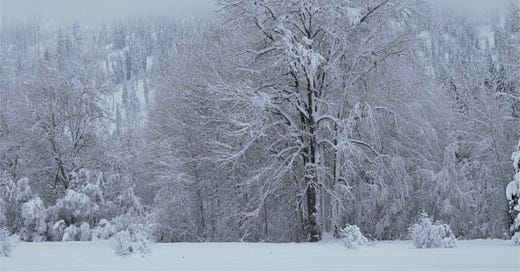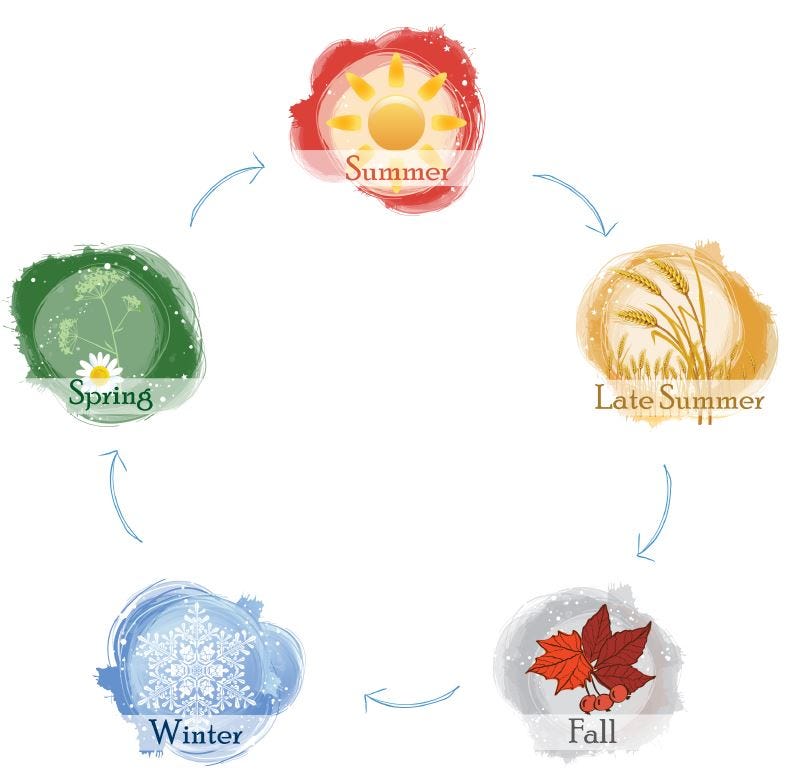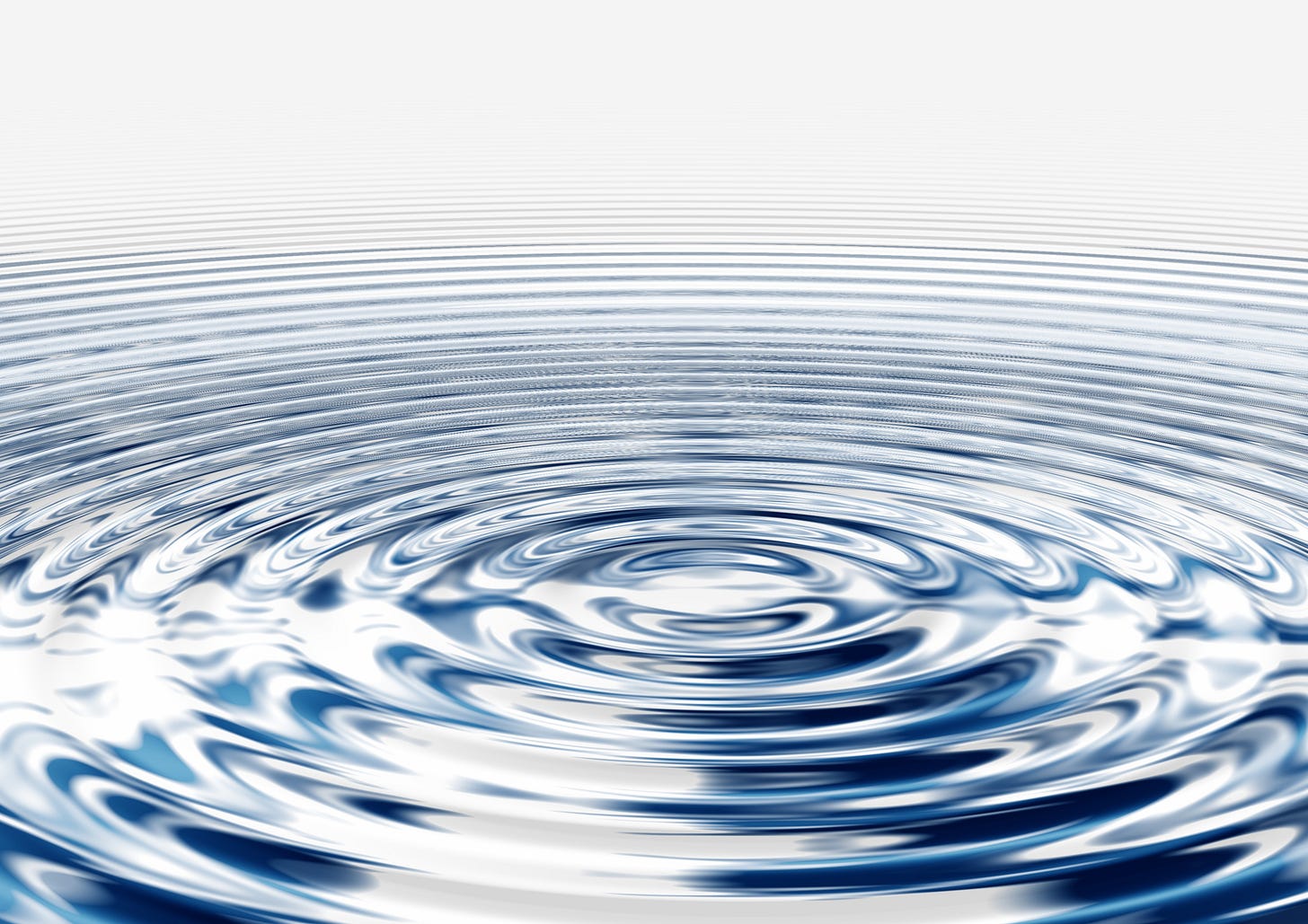Welcome to the second post on The Five Phases. The first two paragraphs below repeat the introduction to this Traditional Chinese Medicine concept. You can find the first post in this mini-series here.
The Cosmic Dance of the Seasons
For many cultures, the changing seasons signal when it's time to alter both external and internal activities. Our ancestors believed that aligning with what was happening "in nature" helped them to live harmoniously and in right relationship with the world around them. Indeed, they didn't see themselves apart from nature at all. As an integral part of nature, following Mother Earth's cues helped them survive.
Traditional Chinese Medicine (TCM) divides the year into Five Phases. Also known as Wu Xing or the Cosmic Dance of the Seasons, it is a way of explaining both the inner and outer worlds that we inhabit. Although the People's Republic of China is relatively new, TCM has been used for over 5,000 years to understand, diagnose, and heal. TCM is an intricate and highly effective system created by observing nature's cycles and interpreting and applying them to people.
In American culture, we stack our major holidays of Halloween, Thanksgiving, Christmas, and New Year’s Eve into a cramped two months. (Well, to be fair, the holiday decorations now start to hit the stores in August.)
Our holiday season tends to be stressful and focused on doing all the things. Did we buy all the gifts? bake all the cookies? send all the cards? decorate the whole house and yard? drink the nog? watch all the movies? attend all the festivities?
Did we jingle hard enough??
It’s easy to forget during and after the busy holiday season that the rest of nature is, well, resting. Sleeping. Hibernating. Dreaming. Conserving energy. (Why aren’t we?)
In the Five Phases, Winter is the beginning of the new cycle. Before the seed germinates, it must be planted. Before we set forth or take action, we must first have an idea, a desire, an impulse. In Winter, we dream in the dark.
Each season, or phase, also corresponds to a specific element. Winter is associated with Water. In Winter, we encounter (endure) harsher weather that shows water in many forms: rain, snow, sleet, ice. Water also symbolizes both life and death. It is the primordial soup from which all life emerges, the womb, the wellspring of creativity, and the depths to which we return.
Themes of Winter (Water)
The themes associated with Winter or Water are reflection and rejuvenation. It is a time to rest, renew, and regenerate. It’s where you conserve your energy as well as recharge your batteries. In Nature, the seed is ensconced in the earth, full of potential, gathering strength to burst forth in the spring.
Winter can also be harsh, and survival is not always a given. Our ancestors worked hard to ensure they would have enough fuel and food to last until spring. While modern life provides us with more security, wintry conditions can still threaten our well-being ranging from power outages to airborne illnesses.
Each phase is also associated with organs in the body. TCM relates Winter/Water to the kidneys and bladder. Kidneys are considered the “batteries” of the body. Cold temperatures can constrict blood flow and overtax the kidneys, leading to symptoms of fatigue, cold sensitivity, and/or urinary issues.
The kidneys are also susceptible to fear and overwork. The Winter phase does not come easily to most people in modern Western culture. We are doers. “Resting,” “Dreaming,” and “Napping,” are not usually socially acceptable answers to “What have you been up to?” If we’re not going, striving, accomplishing, then who even are we? We can be on autopilot - just doing for the sake of doing, without really knowing why or where we’re headed.
Gail Reichstein, author of Wood Becomes Water, writes:
“A well-balanced Water element allows us to move through the world with confidence and calm. It gives us a sense of strength and an awareness of our ability to handle even difficult situations. Water also provides for endless creativity and a love of relaxation and quietude. Healthy Water gives us a balanced perspective on our own struggles, and the ability to view the struggles of others with compassion.
Because of its deep interiority, the Water within us is easily drowned out by our busy lives and manifold obligations. When this happens, we lose touch with inner peace, wisdom, and our sense of knowing. We may feel exhausted, depressed, out of sync, or just plain irritable. This is a time to dive into our private oceans, to reacquaint ourselves with who we are and what we need. Only after we have taken this valuable time for ourselves can we begin to interact properly with the outside world.”
The Gifts of Winter (Water)
When we are fully embodying or honoring the season of Winter, we are unplugging from external distractions and listening deeply to ourselves. We are taking required downtime to uncover or discover what we truly need and desire. What are the dreams we will bring into and build on over the next cycle?
Winter also asks us to dig deep. It teaches us endurance as we persevere through the cold, dark, and bleak until spring. Winter calls upon our courage: we know that it will eventually give way to spring, but can we hold on that long?
The gifts of Winter or Water include:
Pure potential (your dreaming and reflecting time).
Non-action (or being still, as evidenced by animals hibernating and dormant plants – not our own scurrying about).
Deep listening.
Perseverance and endurance.
Survival.
Courage in the face of the unknown.
How do you know if you are living in harmony with the Winter phase? You are able to:
Use your energy wisely to follow your passion and manifest your purpose.
Balance courage and healthy fear.
Find enough stillness to allow time for reflection and rejuvenation/regeneration.
“Living in harmony” requires continual adjustments: some days are better than others. The following are clues for when you might need to bring yourself back into balance in this Winter phase. You can usually tell how you’re out of balance by the quality of your energy: do you feel more fretful/anxious (you might want to lean into more of Winter’s gifts), or “heavier” and more depressed (you may be hitting those gifts a little too hard)?
How can you tell if you are under expressing Winter (Water deficient)? You may:
Find it difficult to be still.
Find it difficult to not know.
Feel fearful.
Be stressed out.
Feel exhausted, but can’t sleep.
Be constantly going and doing.
Hint: Most of us tend to be Water-deficient, especially in North American cultures.
How can you tell if you are over expressing Winter (Water excess)? You:
May also feel exhausted and fearful.
Are often depressed.
Have suppressed immunity.
Can’t keep going.
Feel stuck.
Practical tips for living in harmony with the Winter season
If you find yourself feeling out of balance during this season, you might want to try one or more of these helpful practices:
Create space where it feels safe to slow down.
REST, meaning deep sleep and naps. Sitting on the couch watching Netflix doesn’t count!
Learn to prioritize and say “no” to activities that just deplete you.
Take time to really listen to yourself and others.
Find courage. Take heart that you know enough and are enough to take the next step.
Find a way to connect with yourself on a deeper level. Try journaling your dreams or creating art.
Luxuriate in long baths or hydrotherapy (soak your feet or hands). Have you tried a float tank yet?
Allow time for daydreaming and self-reflection.
Move your body gently. Try light yoga, tai chi, stretching, or walking. Winter isn’t a good time for activities that make you really sweat.
Work with your ancestors/lineage. We hold the strengths of our ancestors as well as our own personal power.
To really thrive in Winter, look for ways you can bring a settling, grounding, and open energy to your days. Do you have enough silence to listen to yourself? Do you have capacity to live with uncertainty? Do you have the ability to sit, be still, and feel content – to be receptive to what comes your way?
Sources:
Reichstein, Gail. Wood Becomes Water: Chinese Medicine in Everyday Life, New York: Kodansha USA, Inc, 1998. Print.
Larken Bunce. Five Phases: The Nature of Your Health. Nov. 2015. Webinar.
Originally written 2018; edited January 2025.









